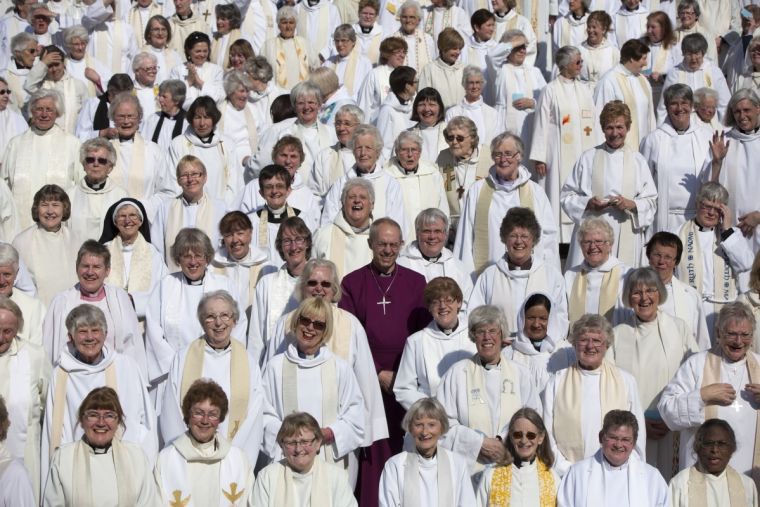Is it time to stop talking about the 'feminisation of the church'?

For decades research has found that women in the UK and USA have a greater level of religiosity than men – praying daily, attending church regularly and having a higher level of involvement in church activities. There are numerous theories – from industrialisation to gender roles to the fact Christianity offers women more of an involved role in religious life than some faiths – attempting to explain the so-called 'worship gap'. But as far as academics are concerned, these theories remain inconclusive.
In Christian culture, however, one particular explanation for the higher ratio of women to men has taken hold. Generally known as the 'feminisation of the church', it's a theory that puts the imbalance in religiosity down to church services and activities that appeal more to women than to men. Worship songs with sentimental language are often cited as problematic, as are small group models that encourage relational interaction. Church activities that centre on stereotypically feminine modes of socialising and 'touchy-feely' spirituality are allegedly driving men away from Christianity – or if they're staying, emasculating them.
Panic about 'feminisation' has seen numerous books published, encouraged people to set up ministries aimed specifically at men and served as a springboard for the careers of church leaders like Mark Driscoll. Despite the good intentions of some, it's unfortunate that many of these books and organisations rely on rigid gender stereotypes and sometimes quite explicitly derogatory attitudes towards women to communicate their message, forgetting as they do so that there is as much variation between individual men as there is between men and women.
A quick search online for 'feminisation of the church' reveals that blame for the perceived lack of men in churches is being apportioned to numerous groups of women: domineering mothers, female primary school teachers, bossy women who rule the roost in church life – as well as society in general due to, as some see it, a disregard for men and the vilification of masculinity.
It's intriguing, then, that a Pew Research Center report published last month confirms that the 'worship gap' – the higher ratio of women to men attending religious services – in the USA has been narrowing in recent years. In the mid-1980s, 38 per cent of women and 25 per cent of men reported attending weekly religious services. Since then, weekly attendance at religious services has declined generally, but with a narrowing gender gap so that by the time figures were compiled for 2012, 28 per cent of women and 22 per cent of men were attending a weekly service, reducing the gap from 13 to six per cent.
What has stood out about this report is the fact that it is women's attendance at religious services that has declined the most since the 1980s – not the attendance of the 'missing men'.
The international data on weekly worship service attendance, available for 81 countries, makes for fascinating reading – showing a gender gap of just five per cent in the UK. A key theory explaining the narrowing gap relates to women's increasing participation in the workforce and higher education – two things that show a correlation with decreased religiosity.
Whether this is the case or not, Pew's findings should give Christian culture cause to reassess the messages it has absorbed and consistently promoted about the 'lack of men' in the church. It's true that in some countries where Christianity is the main religion, a significant gender gap can be seen. But in the USA and the UK, that gap is barely statistically significant (despite data showing that UK church congregations as a whole tend to be between 35 and 40 per cent male). It should also give us cause to look more closely at the 'reasoning' behind the gender gap that has been widely promoted.
If men have been turned off church in recent decades by sentimental music, emotional preaching and an atmosphere that's altogether too 'feminine', why are women, too, leaving the church – and at a greater rate than men? Perhaps the answer lies in the fact that commitment to the Christian life isn't as straightforward as relying on adherence to traditional gender stereotypes.
Writing for Religion Dispatches, Patricia Miller suggests that for the decline in women attending regular services, there is correlation with key events of the 'culture wars' in the – sex scandals, an obsession with abortion, hostile attitudes towards birth control and general rejection of gender equality.
Anecdotally, I know that the reputation of the church when it comes to the treatment of women puts women off getting involved or even attending church at all. I know, for example, numerous women who, while remaining believers, do not attend church and have not done so for years. Their reasoning? Feeling excluded and disappointed by negative attitudes towards women that they've encountered.
With church attendance from both men and women declining, it's obvious that there is no simple explanation for why this has happened and why the gender gap exists. It shows the need to consider a variety of factors when looking at declining church attendance, rather than using the gender gap as an excuse to attack women in general – but particularly female leaders – and 'effeminate men', as some have done.
What's also obvious is that while church initiatives that rely on gender stereotypes may be attractive to some, they're also incredibly alienating for others and often fall into the trap of appearing to be little more than a reaction against increasing gender equality in society. The church must reach out to all according to the specific needs in diverse communities and groups of people – because initiatives founded on traditional gender stereotyping will only ever appeal to a minority.
Hannah Mudge writes about feminism and faith and is one of the founders of the Christian Feminist Network. She works in digital communications and fundraising for an international development organisation. Follow her on Twitter @boudledidge











